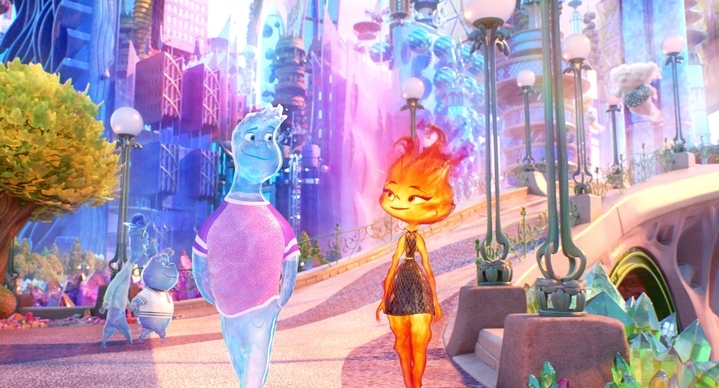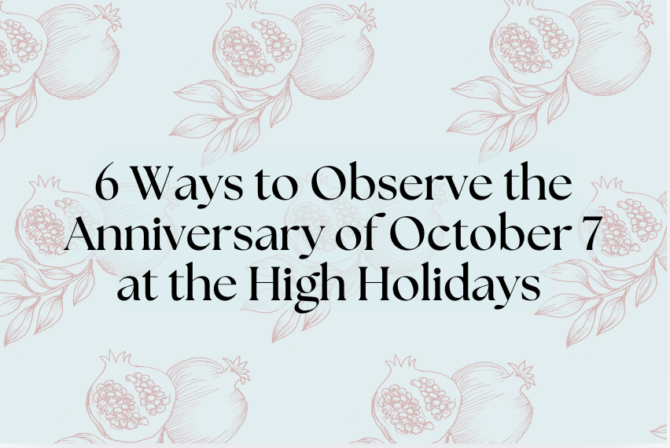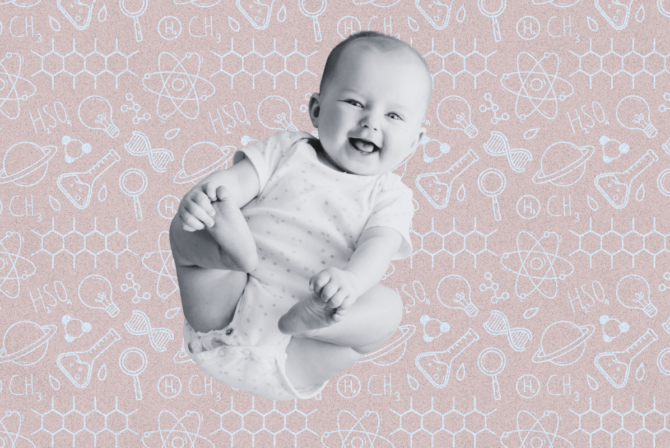When I took my kid to see Pixar’s new “Elemental” at the movie theater last weekend, it was mostly an excuse to get us out of the house after a monotonous summer week mostly stuck at home. Frankly, I wasn’t expecting much: We’d seen some previews, but they were so vague that we didn’t have much idea of what the movie would even be about. If anything, to me at least, the previews made it seem like one of those flicks for kids that’s more of a reason to generate merch sales than anything else.
I couldn’t have been more wrong.
Not only did I have to muffle myself from sobbing in the middle of a theater before 10 a.m. on a Sunday morning because it was such a touching story — but I immediately picked up on the movie’s connection to the Jewish American experience as I watched the story unfold.
Now, let me stop here and just clarify that this narrative is not specifically Jewish; in fact, it’s based off of director Peter Sohn’s childhood experience of growing up in the ‘70s in New York City as the child of Korean immigrants. And, to my knowledge, none of the voice actors are Jewish themselves. Nonetheless, the narrative is such an earnest depiction of the immigrant experience that any minority population who can trace their roots back through Ellis Island could see themselves in it — Jews very much included.
Without giving too much away, the basic premise of the movie is this: In a world where all the people are elements (Water, Earth, Wind and Fire), a married Fire couple leaves their home country and everything they’ve ever known, making an arduous journey by boat across the world to find a better home where they can raise the baby they are expecting. They journey to the island of Element City — a beautiful, thriving metropolis of abundance and opportunity. However, they soon discover that they are some of the very first Fire elements to arrive on the island, and are treated with deep mistrust by the other elements.
Their arrival at Element City is what I mentally refer to as the “Ellis Island” scene: They step off the boat onto their new homeland, queue up at the immigrant processing center and reach the desk where an Earth person is filling out their immigration paperwork. He asks for their names, and they respond in a language of unique sounds unlike anything the clerk has ever heard. With strained politeness, the clerk asks how to spell that (and the response is more sounds that are most definitely not spellable). Finally, he says with cheerful brevity, “How about we just go with Bernie and Cinder?” He then stamps their paperwork and sends them on their way. (While there’s a lot of pushback as to how much this kind of misunderstanding actually happened to immigrants at Ellis Island, it’s a story many Jewish Americans still joke about when it comes to family names.)
That’s not where the comparison ends, though. Bernie and Cinder Lumen build a shop from the ground up in a less affluent neighborhood, where they sell authentic Fire foods and items customary to their homeland. It quickly attracts other Fire people to the area, becoming the heart of a thriving Fire community. Meanwhile, the Lumens also welcome their daughter (and the movie’s protagonist), Ember, into the world.
Once Ember grows up, she finds herself precariously caught in the middle of who she’s expected to be by her parents (and the blue flame that’s literally called their “tradition”), how other elements view Fire, and who she truly wants to be. This all gets even more precarious when she unexpectedly meets Wade Ripple, a sensitive, caring Water guy. Thrown together by circumstances outside of their control, they begin to appreciate each other’s strengths and differences — as well as what they have in common — and find themselves falling in love.
Here’s the big problem: The ongoing refrain throughout the movie is that elements don’t mix, which makes their relationship taboo — even more personally relevant considering Bernie’s deep dislike of Water elements (“they want to water us down!”). Ember is terrified of her parents discovering their relationship, fearing their disappointment and disapproval of her dating someone who isn’t Fire. After all, the pressure to be with another Fire person is set early in Ember’s life: A humorous flashback shows a melodramatic scene of her old Fire-country grandmother on her deathbed, imploring with her final breath: “Marry Fire!” While the Jewish community overall is steadily making progress toward accepting and celebrating multicultural relationships between Jews and our non-Jewish counterparts, there are still plenty of Jewish Americans who feel pressured to “Marry Fire,” many of whom can surely relate to an older relative interrogating, “When are you going to find a nice Jewish boy/girl to settle down with, already?!”
However, it’s not just Bernie’s learned misgivings of Fire people that the couple must navigate — or even the Ripple family’s friendly but out-of-touch attempts to be “open minded.” They must also learn to negotiate their own multicultural relationship, and learn how they can exist together as two opposite elements. As even the most in-love interfaith couple knows, there’s some adjustment when two people of different cultures come together, such as the first time they maneuver their way through the winter holidays. Personally, I remember once arguing with a boyfriend because he wanted to do an Easter egg hunt, and I suggested filling the plastic eggs with some gelt I had leftover from Hanukkah. (He was not enthused, but I still don’t really see the problem.)
Overall, this movie was laugh-out-loud and tear-jerkingly heartwarming in equal turns, visually delightful, and entertaining enough to keep my 9-year-old’s attention gripped the entire length of the film. But I especially think it’s a great flick to see with your kids to give them a foundational context for learning more about the history of Jewish culture in America, and the important mitzvah of welcoming those who are different from you.
My advice for a wholesome, Jewish family activity this summer? Take your kids to see “Elemental” at your local theater. Then open a dialogue with them afterwards by asking, “Did you know that Jewish people had their own Element City when they came to America, just like Bernie and Cinder?” Let your kids associate the uplifting, cathartic hopefulness of this movie with their own identities — so that they realize no part of themselves as Jewish Americans has to be watered down.








